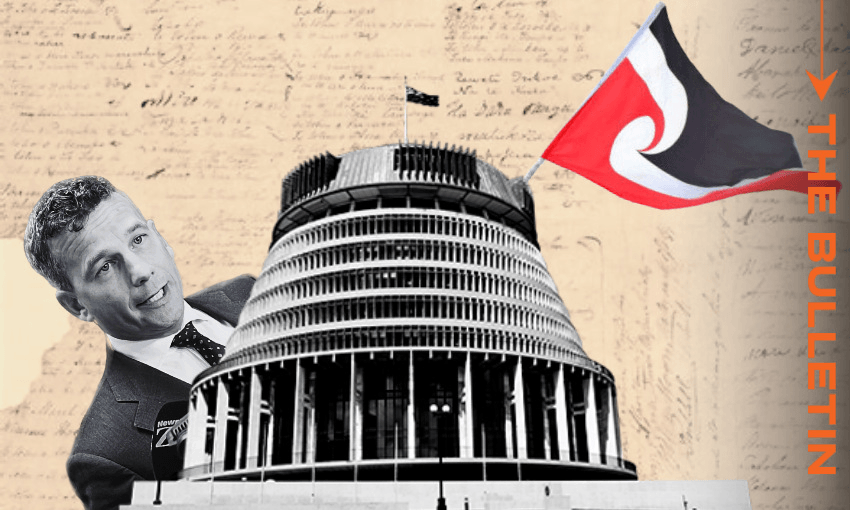As the government chases billions in unpaid student debt, new funding has empowered Inland Revenue to get tough on debtors overseas and at home, writes Catherine McGregor in today’s extract from The Bulletin.
To receive The Bulletin in full each weekday, sign up here.
Loan defaulters face increased enforcement
Last month, a student loan defaulter was arrested at the New Zealand border, a rare move by Inland Revenue (IR) that signalled a new phase in its crackdown on overseas-based borrowers, sometimes referred to as OBBs. According to IR, more than 70% of the estimated 113,000 student loan OBBs are in default, with $2.3 billion outstanding, much of it in penalties and interest.
While arrests remain a “last resort”, they’re likely to continue as IR gets tougher on student borrowers who have stopped paying off their loans while overseas, reports RNZ’s Susan Edmunds. IR is actively monitoring the border for 150 borrowers with a combined default of $15m, and 89 people have been informed they may be arrested upon arrival. Legal action is also being used against those with assets in New Zealand, potentially including bankruptcies, charging orders on property, and investment deductions. Since July, $207 million has been recovered from student loan borrowers living overseas, a 43% year-on-year increase.
Calls for leniency rejected as pressure mounts
Among those watching the crackdown closely is Auckland tax expert Dave Ananth, who has become an unlikely ally to distressed OBBs. Profiled by Rob Stock in The Post last month (paywalled), Ananth has helped negotiate six-figure penalty waivers in exchange for full repayments, giving clients the chance to return home without fear. He argues the punitive structure of the system – where a $45,000 loan can balloon to over $100,000 – needs reform, including a full or partial amnesty. But revenue minister Simon Watts has ruled this out, noting a similar effort in the 2000s had limited uptake.
Instead, the pressure is rising. Since April 1, another 1% has been added to student loan interest rates, taking the base rate to 4.9%, the late payment rate to 8.9%, and the reduced late payment rate to 6.9%. CTU economist Craig Renney tells Edmunds it’s a backwards move that won’t raise meaningful revenue and risks discouraging skilled workers from returning home. “There will be some people making the horrible decision about not seeing their family again,” he says.
IR’s turbocharged enforcement drive
The crackdown on student debt is just one front in Inland Revenue’s wider compliance push, supercharged by a $165 million funding boost in last year’s budget. That investment is paying off: from July to December 2024, IR says it opened 3,600 audits – 50% more than the previous year – resulting in the discovery of $600 million in undeclared tax, with nearly half from just 10 large cases. Altogether, audits, data screening and voluntary disclosures added $859 million to tax revenue.
Recent IR figures show that the return on tax compliance investment is nearly ninefold – a fact that makes another funding boost likely in next week’s budget, says Chapman Tripp. With the government needing to make savings but eager to avoid spending cuts, it will be “looking to optimise its existing tax base”, the law firm warns, “meaning that taxpayers can expect increased information requests, audits, tax disputes and prosecutions”. Enforcement has already picked up, with court-ordered liquidations in the second half of last year increasing 84% over the same period in 2023.
Property speculators and pandemic borrowers under scrutiny
Two other groups firmly in IR’s sights are property investors and recipients of pandemic-era loans. In a review of 1,283 property-related tax cases, IR says it uncovered $153.5 million in undeclared income tax and GST – an average discrepancy of nearly $120,000 per case. Much of it stemmed from developers who claimed early GST refunds but failed to file or pay taxes after selling, 1News reports.
Meanwhile, businesses that borrowed under the small business cashflow (SBC) loan scheme are on notice: from June, default interest of 10.88% will apply to unpaid loans. The scheme, introduced in 2020 to support struggling businesses, issued $2.4 billion in loans, but $853 million remains outstanding, reports David Hargreaves at Interest. The loans were interest-free for the first year then subject to a 3% rate, for a maximum loan period of five years. Over 14,000 loans are already in default, prompting IR to take direct bank deductions and warn of legal action ahead.
More from The Spinoff:
- Megan Dunn: My number one regret? My $100,000 student loan
- Michelle Fitzgerald: What happens when you have a student loan and leave NZ


